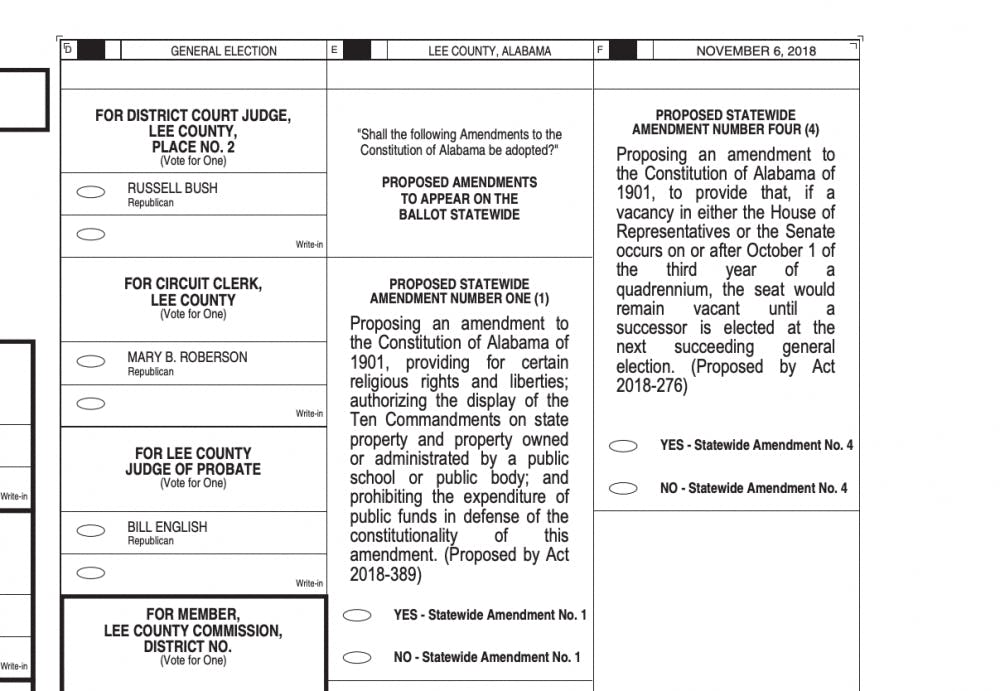There are more than 30 different state and local elected positions on the Nov. 6 ballot, but that isn't all.
If you're going to vote on Tuesday, you'll also see four proposed constitutional amendments on your ballot. These ballot measures require a majority vote on Nov. 6 to be added to Alabama's already lengthy state constitution.
The four amendments, with topics ranging from the Ten Commandments to abortion, were proposed during Alabama's 2018 legislative session.
All were sponsored by Republicans.
The amendments will have short explanations on the front side of the ballot, but you can find a more detailed explanation of the amendments on the back side of your ballot Tuesday.
But before you head to vote, here's a breakdown to help you understand what your vote means.
Amendment 1 — Concerning the Ten Commandments, religious liberties
Statewide Amendment 1 would add language to Alabama's Constitution that would allow the Ten Commandments to be displayed on public property including schools.
Here's the text that will be on the ballot:
"Proposing an amendment to the Constitution of Alabama of 1901, providing for certain religious rights and liberties; authorizing the display of the Ten Commandments on state property and property owned or administrated by a public school or public body; and prohibiting the expenditure of public funds in defense of the constitutionality of this amendment."
But the amendment has one big catch, which you won't see in that front-side ballot language: Displays would only be allowed if they meet "constitutional requirements."
Alabama's Constitution currently has no mention of the Ten Commandments. The full text of the amendment, which also won't accompany the measure, adds that appropriate uses of the Ten Commandments could be in educational or historical displays.
The amendment, proposed by State Sen. Gerald Dial, R-Lineville, also prohibits public funds from being used to defend the amendment in court. It could still be defended by private groups.
There has been disagreement about how much of an impact the proposed amendment would have. Displays of the Ten Commandments that meet constitutional requirements are already allowed. And U.S. Supreme Court precedent — which overrides state constitutions — prohibits displays of the Decalogue on public property for a religious purpose.
Republicans and conservative groups have largely supported the amendment, while Democrats and liberal groups have opposed it.
A "yes" vote would add the amendment to the constitution. A "no" vote would keep the Ten Commandments out of Alabama's constitution.
Amendment 2 — Concerning abortion
Amendment 2 has been described as an anti-abortion amendment. It would essentially declare Alabama a "pro-life" state.
Here's the front-side ballot language:
"Proposing an amendment to the Constitution of Alabama of 1901, as amended; to declare and otherwise affirm that it is the public policy of this state to recognize and support the sanctity of unborn life and the rights of unborn children, most importantly the right to life in all manners and measures appropriate and lawful; and to provide that the constitution of this state does not protect the right to abortion or require the funding of abortion."
Opponents have said the amendment, sponsored by Republican State. Rep. Matt Fridy, could pave the way for an abortion ban in Alabama. But again, Supreme Court precedent has protected abortion rights nationally.
The amendment wouldn't alter any laws or add any new laws. It would only create a public policy.
The bill's sponsor and many of its Republican backers have said the amendment is an effort to prepare for the case that the now-solidly conservative Supreme Court may overturn Roe v. Wade and other cases that protected access to abortion.
The supporters say it is needed to clarify that Alabama wouldn't protect the right to an abortion if the Supreme Court precedent is overturned.
Republicans and conservative groups have largely supported the amendment, while Democrats and liberal groups have opposed it.
A "yes" vote would add the amendment to the constitution. A "no" vote would leave the constitution as-is.
Amendment 3 — Concerning the University of Alabama Board of Trustees
The last two amendments on the ballot are less controversial. Amendment 3 would freeze the make-up of the University of Alabama's Board of Trustees.
Here's the front-side ballot language:
“Proposing an amendment to the Constitution of Alabama of 1901, relating to the Board of Trustees of the University of Alabama, to specify that the congressional districts from which members are appointed continue to reflect those as constituted on January 1, 2018, to remove the State Superintendent of Education from membership, and to delete the requirement that members vacate office at the annual meeting of the board following their seventieth birthday."
The board is currently based on the state's seven congressional districts. But state officials fear that Alabama could lose a congressional seat after the 2020 Census. If that were to happen, Alabama's board of trustees could decrease in size.
The amendment, proposed by State Sen. Greg Reed, R-Jasper, would keep the board's composition as it is now, isolating it from any changes to Alabama's congressional districts. Instead, the board would continue using Alabama's seven current districts even if those districts are changed after 2020.
There would be a small change to the board if the amendment passes. The state superintendent of education would be removed from the board. It would also drop an already unenforceable age limit.
Legislation authorizing the amendment to go on the ballot was approved unanimously in the State Legislature.
A "yes" vote would approve the constitutional amendment, insulating the board from any changes to the congressional districts. A "no" would leave current language in place, meaning the board could be altered if the districts change after 2020.
Amendment 4 — Concerning legislative vacancies
Amendment 4 would reduce the number of special elections to fill state House and Senate vacancies.
The amendment would end the practice of calling a special election nearly every time a seat in the state House and Senate becomes vacant.
Instead, if a vacancy occurred after Oct. 1 of the year before a regularly scheduled general election, that vacancy would go unfilled until the regularly scheduled election.
Vacancies could go unfilled for 13 months at most if the amendment passes.
Here's the full front-side language:
"Proposing an amendment to the Constitution of Alabama of 1901, to provide that, if a vacancy in either the House of Representatives or the Senate occurs on or after October 1 of the third year of a quadrennium, the seat would remain vacant until a successor is elected at the next succeeding general election."
Proponents of the amendment say it would save money used to administrate special elections. The proposal got wide support in the Alabama Legislature.
A "yes" vote would reduce the number of special elections. A "no" vote would leave current rules in place.
Do you like this story? The Plainsman doesn't accept money from tuition or student fees, and we don't charge a subscription fee. But you can donate to support The Plainsman.

Chip Brownlee, senior in journalism and political science, is the editor-in-chief of The Auburn Plainsman.





